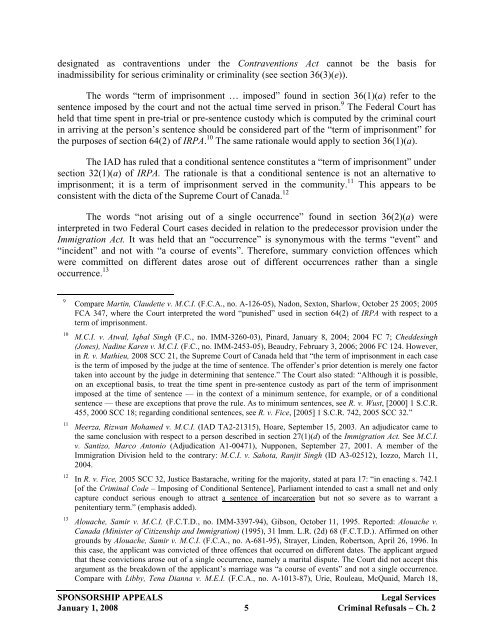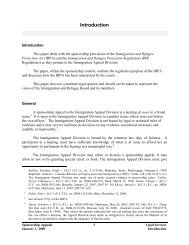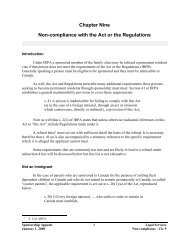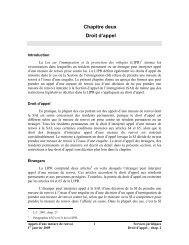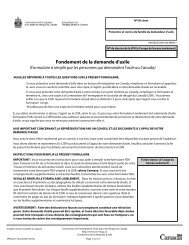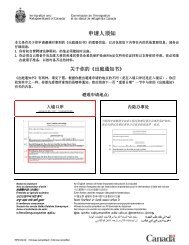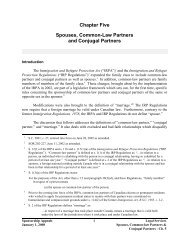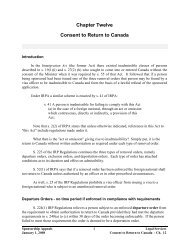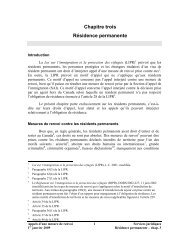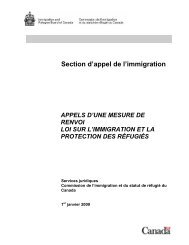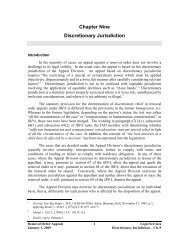Sponsorship Appeals - Immigration and Refugee Board of Canada
Sponsorship Appeals - Immigration and Refugee Board of Canada
Sponsorship Appeals - Immigration and Refugee Board of Canada
You also want an ePaper? Increase the reach of your titles
YUMPU automatically turns print PDFs into web optimized ePapers that Google loves.
designated as contraventions under the Contraventions Act cannot be the basis for<br />
inadmissibility for serious criminality or criminality (see section 36(3)(e)).<br />
The words “term <strong>of</strong> imprisonment … imposed” found in section 36(1)(a) refer to the<br />
sentence imposed by the court <strong>and</strong> not the actual time served in prison. 9 The Federal Court has<br />
held that time spent in pre-trial or pre-sentence custody which is computed by the criminal court<br />
in arriving at the person’s sentence should be considered part <strong>of</strong> the “term <strong>of</strong> imprisonment” for<br />
the purposes <strong>of</strong> section 64(2) <strong>of</strong> IRPA. 10 The same rationale would apply to section 36(1)(a).<br />
The IAD has ruled that a conditional sentence constitutes a “term <strong>of</strong> imprisonment” under<br />
section 32(1)(a) <strong>of</strong> IRPA. The rationale is that a conditional sentence is not an alternative to<br />
imprisonment; it is a term <strong>of</strong> imprisonment served in the community. 11 This appears to be<br />
consistent with the dicta <strong>of</strong> the Supreme Court <strong>of</strong> <strong>Canada</strong>. 12<br />
The words “not arising out <strong>of</strong> a single occurrence” found in section 36(2)(a) were<br />
interpreted in two Federal Court cases decided in relation to the predecessor provision under the<br />
<strong>Immigration</strong> Act. It was held that an “occurrence” is synonymous with the terms “event” <strong>and</strong><br />
“incident” <strong>and</strong> not with “a course <strong>of</strong> events”. Therefore, summary conviction <strong>of</strong>fences which<br />
were committed on different dates arose out <strong>of</strong> different occurrences rather than a single<br />
occurrence. 13<br />
9<br />
10<br />
11<br />
12<br />
13<br />
Compare Martin, Claudette v. M.C.I. (F.C.A., no. A-126-05), Nadon, Sexton, Sharlow, October 25 2005; 2005<br />
FCA 347, where the Court interpreted the word “punished” used in section 64(2) <strong>of</strong> IRPA with respect to a<br />
term <strong>of</strong> imprisonment.<br />
M.C.I. v. Atwal, Iqbal Singh (F.C., no. IMM-3260-03), Pinard, January 8, 2004; 2004 FC 7; Cheddesingh<br />
(Jones), Nadine Karen v. M.C.I. (F.C., no. IMM-2453-05), Beaudry, February 3, 2006; 2006 FC 124. However,<br />
in R. v. Mathieu, 2008 SCC 21, the Supreme Court <strong>of</strong> <strong>Canada</strong> held that “the term <strong>of</strong> imprisonment in each case<br />
is the term <strong>of</strong> imposed by the judge at the time <strong>of</strong> sentence. The <strong>of</strong>fender’s prior detention is merely one factor<br />
taken into account by the judge in determining that sentence.” The Court also stated: “Although it is possible,<br />
on an exceptional basis, to treat the time spent in pre-sentence custody as part <strong>of</strong> the term <strong>of</strong> imprisonment<br />
imposed at the time <strong>of</strong> sentence — in the context <strong>of</strong> a minimum sentence, for example, or <strong>of</strong> a conditional<br />
sentence — these are exceptions that prove the rule. As to minimum sentences, see R. v. Wust, [2000] 1 S.C.R.<br />
455, 2000 SCC 18; regarding conditional sentences, see R. v. Fice, [2005] 1 S.C.R. 742, 2005 SCC 32.”<br />
Meerza, Rizwan Mohamed v. M.C.I. (IAD TA2-21315), Hoare, September 15, 2003. An adjudicator came to<br />
the same conclusion with respect to a person described in section 27(1)(d) <strong>of</strong> the <strong>Immigration</strong> Act. See M.C.I.<br />
v. Santizo, Marco Antonio (Adjudication A1-00471), Nupponen, September 27, 2001. A member <strong>of</strong> the<br />
<strong>Immigration</strong> Division held to the contrary: M.C.I. v. Sahota, Ranjit Singh (ID A3-02512), Iozzo, March 11,<br />
2004.<br />
In R. v. Fice, 2005 SCC 32, Justice Bastarache, writing for the majority, stated at para 17: “in enacting s. 742.1<br />
[<strong>of</strong> the Criminal Code – Imposing <strong>of</strong> Conditional Sentence], Parliament intended to cast a small net <strong>and</strong> only<br />
capture conduct serious enough to attract a sentence <strong>of</strong> incarceration but not so severe as to warrant a<br />
penitentiary term.” (emphasis added).<br />
Alouache, Samir v. M.C.I. (F.C.T.D., no. IMM-3397-94), Gibson, October 11, 1995. Reported: Alouache v.<br />
<strong>Canada</strong> (Minister <strong>of</strong> Citizenship <strong>and</strong> <strong>Immigration</strong>) (1995), 31 Imm. L.R. (2d) 68 (F.C.T.D.). Affirmed on other<br />
grounds by Alouache, Samir v. M.C.I. (F.C.A., no. A-681-95), Strayer, Linden, Robertson, April 26, 1996. In<br />
this case, the applicant was convicted <strong>of</strong> three <strong>of</strong>fences that occurred on different dates. The applicant argued<br />
that these convictions arose out <strong>of</strong> a single occurrence, namely a marital dispute. The Court did not accept this<br />
argument as the breakdown <strong>of</strong> the applicant’s marriage was “a course <strong>of</strong> events” <strong>and</strong> not a single occurrence.<br />
Compare with Libby, Tena Dianna v. M.E.I. (F.C.A., no. A-1013-87), Urie, Rouleau, McQuaid, March 18,<br />
SPONSORSHIP APPEALS<br />
Legal Services<br />
January 1, 2008 5 Criminal Refusals – Ch. 2


